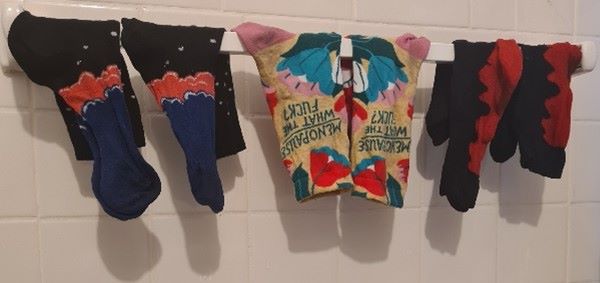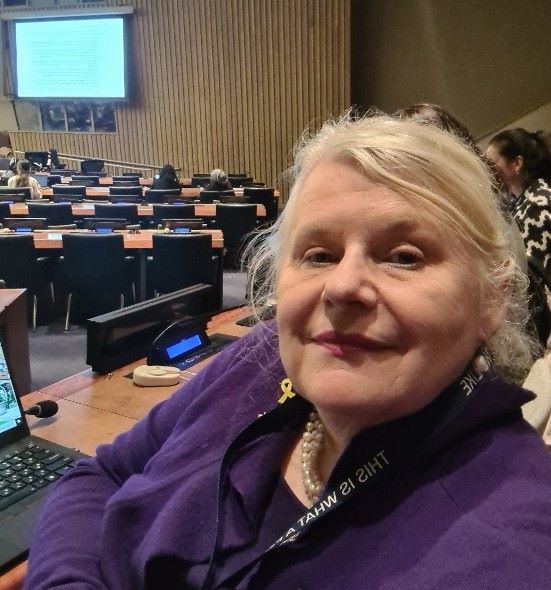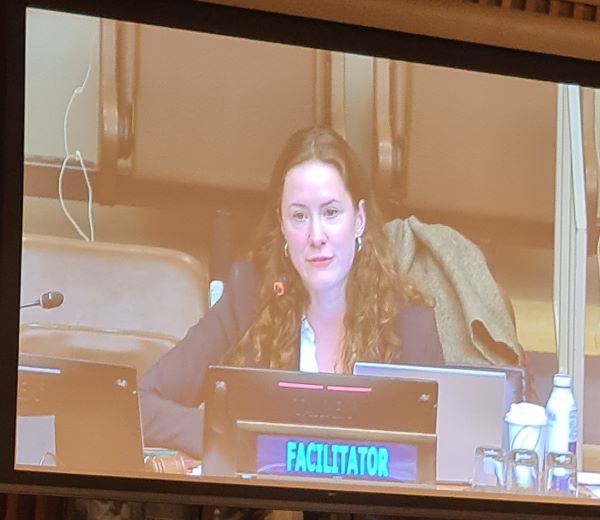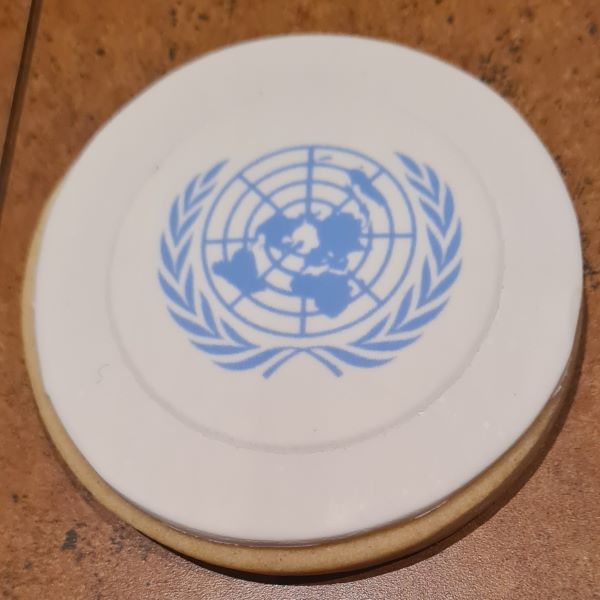‘Kleine wasjes, grote wasjes’ is the song that plays in my mind while I am writing this blog. Small washes and big washes are what my advocacy work comes down to in the CSW69. The small wash being my personal laundry, done by hand, as most travelers do.

Image: socks, including menopause socks, drying
I would also say that the many talks, in corridors, in meeting rooms, in the elevator, I have with women representatives of larger and smaller civil society organizations are another form of ‘small washes’.
The Big Wash is the constant search for a ‘hook’ to put ‘older women’ and / or ‘menopause’ in the minds of governments, of UN agencies, of moderators, of panel members, as well as the minds of the audience in the various Side Events I attend. The grabbing of their attention and their imagination.
I had a good run these weeks.
Robin de Vogel facilitator CSW69For the rights / healthcare / pension of Older Women I accrued the following supporters: president of ECOSOC (ambassador of Canada), ambassador of Kirghizstan, UNESCO director, Secretary-General of the Common Wealth, director of the UN International Organization for Migration, President of the Women’s Council of Denmark, President of the Women’s Council of Indonesia, Ambassador Meryl Frank (ret) now president of the Makeda Global Network, and the list goes on and on.

Image: Artemis in Conference Room 4 during MYPOW negotiations
Let’s be clear: it is hard work to find the hook, get the floor and pose a useful, succinct and convincing question. However, it is working, I can hear ‘older women’ or ‘menopause’ being discussed more and more seriously here.
By the time the MYPOW (Multi Year Program of Work) of the Commission on the Status of Women meeting in Conference Room 4 arrived on Thursday morning I was still unsure whether this attention to the needs of older women would stick. Will I have moved the needle for real? Frankly, I was not really hopeful and expected many more years of pushing and begging to get us the attention we, Older Women, deserve.
To paint the atmosphere of CR4 on Thursday: a closed meeting that I and some other Dutch women (Daphne Visser, Nadia van der Linde) were allowed into the gallery for ‘public’ or ‘observers’. Wait, you now say, IF it was a closed meeting, how did we get in? Being early, being polite, rules are not always clear to the guards of the rooms, so we showed our civil society badges and were let in. We were warned that at some point we would be removed as some government (obviously not the Netherlands) would object to civil society being in the room, even being in the gallery. We were advised to walk past the gallery seats and go further down into the actual meeting room, where there are two rows of seats below the wall dividing public gallery and the actual room for delegates/diplomats. Advice, which we were smart enough to follow up on. The gallery was cleared of civil society observers later that morning, but we managed to stay under the radar and were not removed.
Back to the MYPOW negotiations, deftly, very professionally, led by Robin de Vogel from our Dutch Permanent Mission to the UN. To no one’s surprise, I gather, the Priority themes and the Review themes did not have any reference to older women. However, the ECOSOC had written that ‘Older Women’ should be considered as focal point in 2026, which might be the opening we sought. It was also the reason I had spoken to the president of ECOSOC the day before.

So, that is where we stood. No actual mention of older women in any of the themes for the next 4 years. However, some ECOSOC support to do something about the position of Older Women (essentially, half the female population of our planet).
Image: Robin de Vogel, facilitator of the negotiations in the CSW69
It took hours of negotiations to get to an agreement on the wording of each theme, but even on the sequence (in what year, what theme) of the various themes for 2026, 2027, 2028, and 2029. Slowly each theme became ‘Agreed ad ref’. Robin pushed the negotiations forward by using the method of time-outs in order for the various countries or group of countries, like the African Nations = 54 countries, or Europe =29 countries, or the Pacific countries = 14 countries, to sort out their objections and wishes vis a vis the proposed texts.
Image of one of the time-out conversations

After about 4 hours, the MYPOW was Agreed ad ref and the rest of the text on the document under discussion became what needed to be decided on. The first two items were not agreed upon. But the third was easily accepted, and THAT is where the future of us, Older Women, was given a leg up.
The text is:
OP3bis: Recalls paragraph 67 of General Assembly resolution 79/147 of 17 of December 2024, and invites the Commission to consider to placing the issue of achieving gender equality and the empowerment of all older women as a focus area of its seventieth session; [Agreed ad ref]
Basically, ECOSOC and General Assembly agree that there should be a focus on Older Women in 2026.
Their suggestion was accepted.
We won the first battle.

Image: UN cookie, gift of Quirine Lengkeek to me, when Older Women became focus for 2026
Together with the many women’s organizations in the Netherlands, and around the world, we can make it happen. Especially since the priority theme ‘Strengthening access to justice for all women and girls, including by promoting inclusive and equitable legal systems and eliminating discriminatory laws, policies and practices, and addressing critical barriers.’ gives us another leg up to fight any injustice we might perceive, and the injustices perpetrated in health or otherwise on older women are many.
2026 will be our year!


